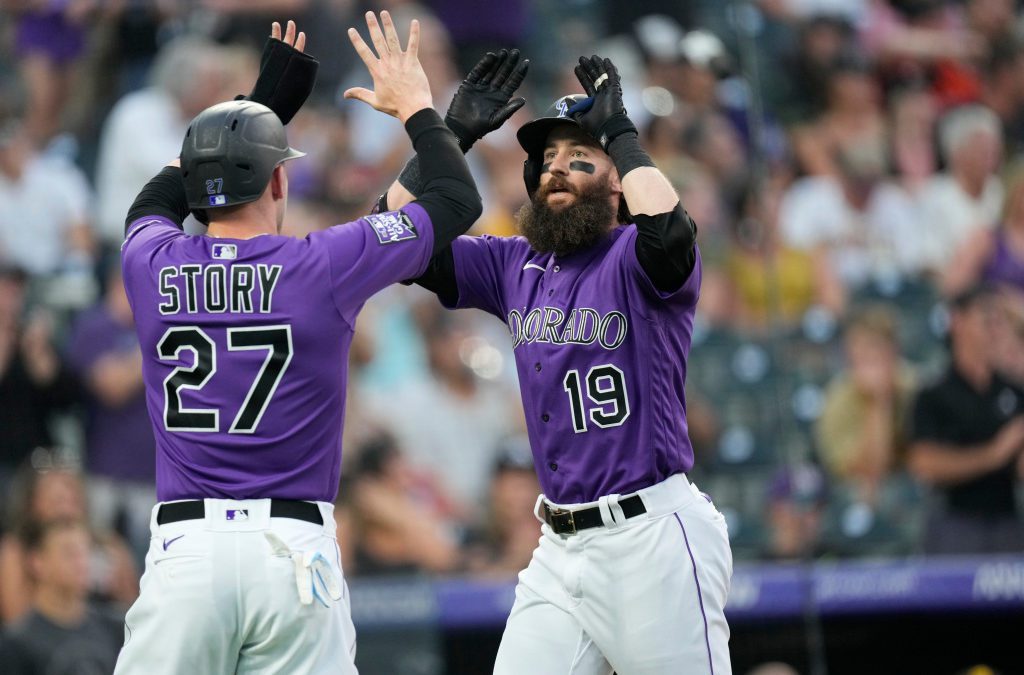For the Rockies, wait until next year has been here for quite some time.
To be more precise, the Rockies haven’t sniffed contention since the end of June 2019 when they were four games above .500. Then came their 6-19 July and ultimately a 71-91 record.
Next came the lost 2020 season amid the coronavirus pandemic, followed by the Nolan Arenado soap opera and trade, and finally, this strange season in which the Rockies are stalking the worst road record in franchise history.
That brings us back to the future and a peek ahead to the offseason and Colorado’s financial situation.
The good news: The Rockies’ affordable starting rotation entered the weekend with 58 quality starts, the second-most in the National League behind the Dodgers’ 63.
The bad news: Even if the Rockies’ starters repeat their success next season — and stay healthy — the lineup has big holes to fill and the bullpen faces a reclamation project.
Can the Rockies make a few bold offseason moves? Will they offer big-dollar contracts to free agents in an effort to make an immediate return to playoff contention? Or is this “draft-and-develop” organization still years away?
“We are going to look to improve,” interim general manager Bill Schmidt said. “There are a lot of ways to add to talent.”
Pressed on whether the Rockies will be willing to spend money on free agents this offseason, Schmidt said: “We are going to look to improve. We will explore all avenues to do that.”
But exactly how open those avenues are is unclear.
One prominent agent said it’s too early to tell if this offseason will be a buyer’s market, which the Rockies, of course, would prefer since the cost of free agents would be lower.
“We don’t know what is going to happen because they’re working on a new CBA (collective bargaining agreement),” the agent said. “There are a lot of moving parts, so I can’t predict what my clients will be looking for, let alone what other players will be looking for.”
The current CBA expires Dec. 1 and preliminary negotiations have already begun. If no deal is reached by that expiration date, the owners could institute a lockout, turning the offseason on its head.
Still, there are some in the industry who believe teams like the Rockies could make a splash once the waters calm.
“The big boys don’t look like they will be in the free-agent market, and it’s a deep one,” said Bob Nightengale, the longtime national baseball writer for USA Today. “So I could see small- and mid-market teams jumping into that pool.”
At the very least, it appears Colorado should have money to spend.
Its total 2021 payroll is $114.1 million, ranking 18th in the majors, according to Sportrac. That’s down significantly from the 2019 payroll of $157.2 million, which was the largest in franchise history.
When the Rockies turned down offers for star shortstop Trevor Story at the July 30 trade deadline, Schmidt made it clear the club did not have to deal Story for financial reasons. In other words, owner Dick Monfort was not looking to jettison payroll.
Still, Monfort’s words after last year’s truncated, 60-game season linger.
“The financial losses incurred across baseball in 2020 are astounding, with losses at nearly $3 billion industry-wide and the average club losing nearly $100 million,” Monfort wrote in a letter to season-ticket holders. “It will take time to rebound, and in some cases, these losses will never be recovered.
“As a result, there will be nothing normal about this offseason as the industry faces a new economic reality, and each club will have to adjust.”
At the box office, the Rockies have adjusted quite well. Despite COVID-19 restrictions at the start of the current season, fans are flocking to LoDo. In fact, the Rockies rank sixth in attendance, averaging 24,147 fans per game at Coors Field. Since restrictions were lifted July 1, the Rockies have averaged 32,747 fans per game.
So it appears there should be some money to spend on a reliever or power bat.
Plus, the Rockies’ 2022 payroll obligations, including projected money for arbitration-eligible players, as well as salaries for pre-arb players, are not heavy. Likely about $80 million.
Veteran right fielder Charlie Blackmon is owed $21.3 million (player option) and right-hander German Marquez will make $11.3 million. Injured reliever Scott Oberg, who will likely not pitch again because of reoccurring blood clots in his right arm, is still on the books for $7 million.
Colorado is paying shortstop Trevor Story $18.5 million this season, but he’ll soon be a free agent looking for a big contract elsewhere.
The Rockies will also finally be out from under Ian Desmond’s five-year, $70 million contract, although the Rockies must pay him a $2 million buyout when they decline the $15 million club option for 2022. After paying $14.4 million of Arenado’s salary with the St. Louis Cardinals this season, the Rockies will only have to pay $5.75 million of Arenado’s contract in 2022. That number, however, jumps up to $21 million in 2023.
The Rockies have a number of arbitration-eligible players who will be in a line for healthy raises. Lefty Kyle Freeland, who’s making $5.025 million this season, could get $8 million to $10 million in his second year of arbitration. Third baseman Ryan McMahon could double his current $2.375 million salary when he hits arbitration for the second time.
A more immediate concern for Schmidt, should he land the permanent GM job, is whether or not he can work out contract extensions with right-hander Jon Gray and first baseman C.J. Cron. Both are scheduled to become free agents and will be looking for multi-year deals.
Gray wants to stay in Colorado, but he could be eyeing a four-year, $40 million deal. Cron, who’s having a strong season with 23 home runs and a .907 OPS, signed a one-year, $6.1-million deal with Detroit prior to the 2020 season. Going forward, he should be in line for a sizeable raise.
After decisions are made on Gray and Cron, the Rockies will begin looking to shore up their shortcomings. Realistically, they are not going to be in the market for stars like Dodgers shortstop Corey Seager, Houston shortstop Carlos Correa or Atlanta first baseman Freddie Freeman.
If the Rockies are serious about beefing up their outfield or adding a designated-hitter type of slugger, perhaps they could target Cincinnati outfielder Nick Castellanos. He has two years and $34 million in guaranteed money left on his contract, but the first-time all-star seems likely to opt out of his contract.
Making trades, of course, could also be part of Colorado’s offseason game plan, but the Rockies are not known as wheeler-dealers and that’s not likely to change.
Total Payroll
2018: $141.3 million (15th in MLB)
2019: $157.2 million (11th, franchise record)
2020: $67.8 million (12th, 60-game season)
2021: $114.1 million (18th)
Key 2022 Payments
OF Charlie Blackmon: $21.3 million (player option)
RHP German Marquez: $11.3 million
RHP Scott Oberg: $7 million (injured, unlikely to play)
3B Nolan Arenado: $5.75 million (paying part of his salary with St. Louis)
OF Ian Desmond: $2 million (buyout when club declines $15 million option)
LHP Kyle Freeland: $10 million (projected salary in second year of arbitration)
3B/2B Ryan McMahon: $5 million (projected salary in second year of arbitration)
Source: Spotrac. Figures are derived from players’ payroll salaries, including the combination of a base salary, incentives and signing-bonus proration.
This content was originally published here.





